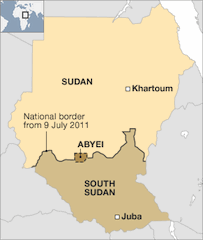S. Sudan links formation of Abyei interim administration to final status
January 2, 2013 (WAU) – The formation of the joint interim administration in the disputed Abyei region will depend on whether the forthcoming presidential summit makes a “successful breakthrough” on its final status, a South Sudanese official said Wednesday.

The decision to form an interim administration in the disputed region was a proposal made by the African Union Peace and Security Council (AUPSC) which at the same time proposed a referendum on the fate of Abyei for October 2013.
Luka Biong Deng, South Sudan’s co-chair for Abyei Joint Oversight Committee (AJOC) told Sudan Tribune that the formation of the interim institutions in the region depends on the outcome of the presidential summit of Friday.
The agreement on the Abyei interim administration was signed on 20 June 2011, but a divergence over the person who will chair the legislative council delayed the process, as Juba was demanding that Khartoum appoints a Nogk Dinka in this position.
Juba several months ago accepted the AUPSC decision to hold the referendum in October of this year and to form an Abyei administration. But, Sudan rejected the proposal because it excludes the Misseriya nomads. Instead, Khartoum opted for the previous AU proposition, which suggested Abyei be divided between north and south.
Deng, however, insisted President Kiir may accept “minor changes” in the Abyei proposal to allow implementation of the deal, but added that the changes will not interfere with the “fundamental” issues.
Such issues, he said, include, voter eligibility, time for the conduct of referendum and head of the referendum commission.
The Abyei referendum was originally due to take place simultaneously to South Sudan’s own independence vote in January 2011. The disagreement over the Misseriya participation froze the process.
“The whole thing is about oil. The National Congress Party is proposing partitioning of the area because of the oil in the north of Abyei, but which we have rejected because it lacks basis. So they are now looking for power and wealth sharing based on the Comprehensive Peace Agreement,” stressed South Sudan’s AJOC co-chair.
He said Khartoum was mainly interested in having Misseriya representation in the administration and to maintain wealth sharing based on the 2005 peace deal.
“This is where some minor changes may be made because our strategic objective is to reach agreement on final status of Abyei so that it comes to the South Sudan”, he added.
The senior South Sudanese official, however, emphasized the importance of the two countries reaching a consensus on the final status of Abyei, saying the formation of an interim administration will facilitate the return of the displaced to the area as well as conduct of a referendum.
“My readings indicate that Bashir will endorse the proposal if Sudan does not want confrontation with the international community and to prevent referral to the Security Council of the United Nations if endorsed by African Union peace and Security Council”, he said.
In 2011, President Bashir dissolved the Abyei administration before agreeing later with his South Sudanese counterpart that South Sudan shall appoint the chair of the executive, while Sudan appoints the speaker of the parliament.
The Sudanese army occupied the area in run-up to South Sudan’s secession displacing thousands of civilians, many of whom have still not returned despite the establishment of a United Nations peacekeeping force in the area.
BASHIR KIIR SUMMIT ON FRIDAY 4 JANUARY
Luka Biong confirmed the long-awaited summit between the Sudanese president, Omer Hassan Al-Bashir and his South Sudan counterpart, Salva Kiir will take place on 4 January.
“I have been informed by our ambassador in Addis Ababa, Ethiopia, that the summit will take place on Friday. They were informed by [the] organising committee,” Deng told Sudan Tribune.
This meeting, should it take place, will be the first since 27 September when the two Presidents signed a Cooperation Agreement in an attempt to resolve differences over oil, citizenship and border security.
However, the agreed buffer zone has not been established meaning that other items of deal, such as resuming the flow of oil through the north, have not been implemented. It is hoped that the Addis Ababa summit will resolve the issues preventing the implementation of the Cooperation Agreement and allow the two presidents to cover the issue of Abyei and other contested areas, which were not part of the September deal.
(ST)
